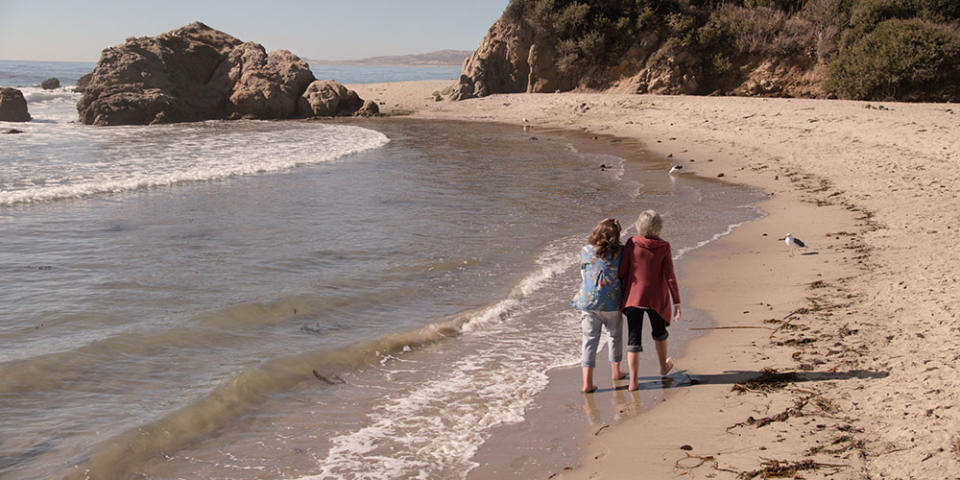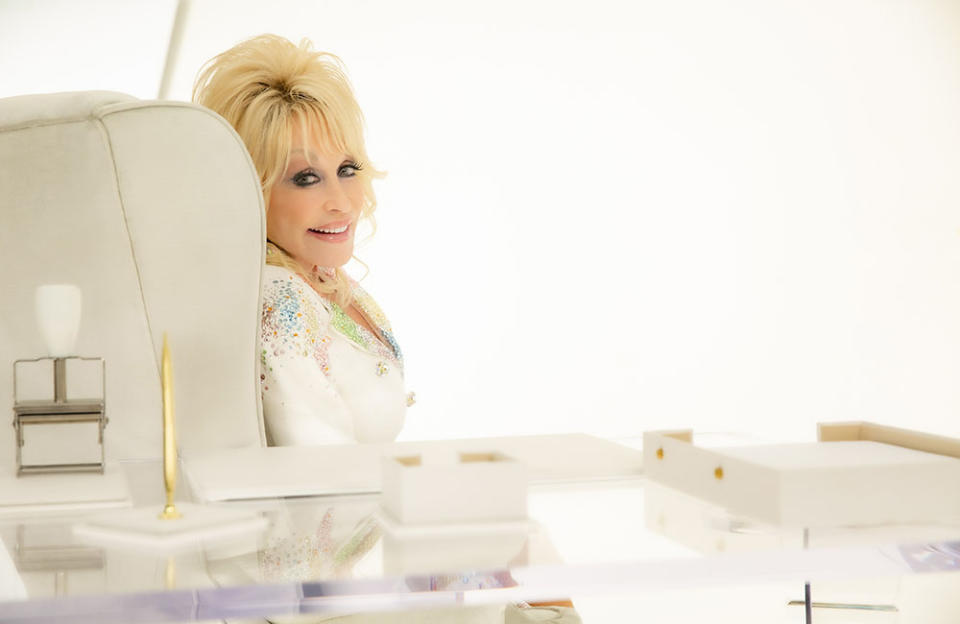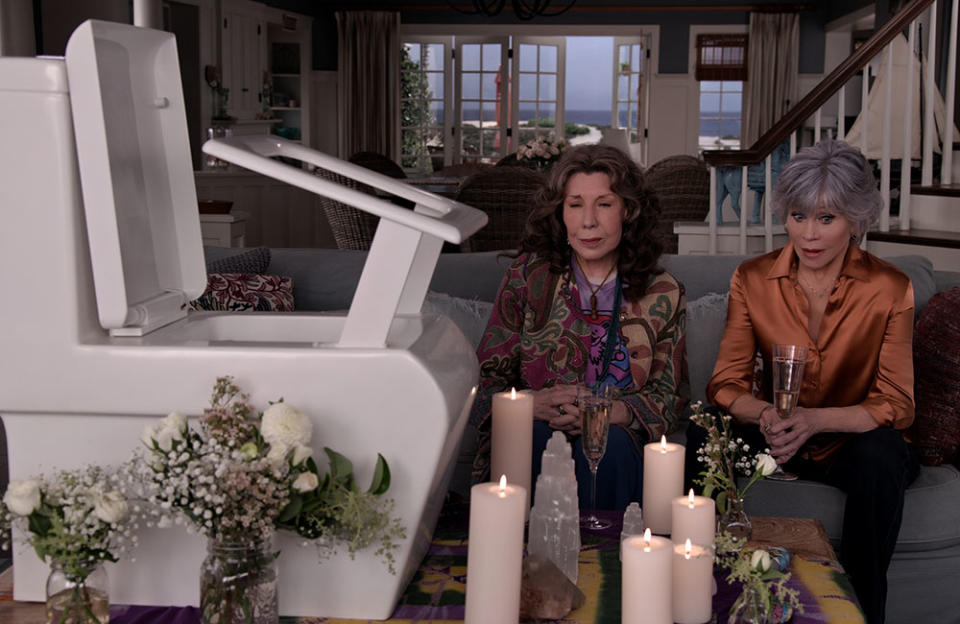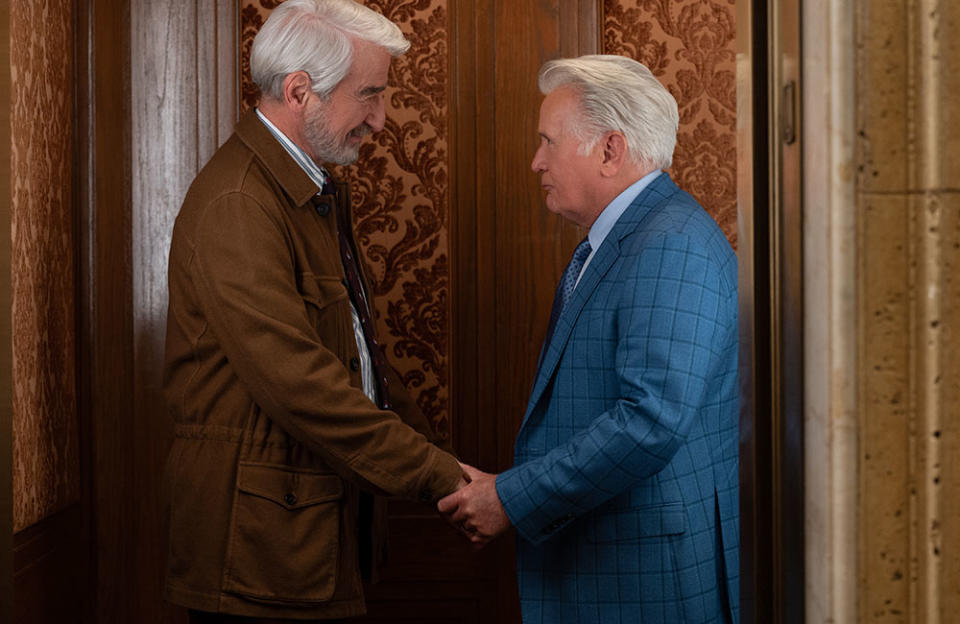Marta Kauffman on the Inspiration of ‘Grace and Frankie’ and Her Hopes Amid a Shifting Industry
- Oops!Something went wrong.Please try again later.
- Oops!Something went wrong.Please try again later.
- Oops!Something went wrong.Please try again later.
- Oops!Something went wrong.Please try again later.
- Oops!Something went wrong.Please try again later.

[This story contains spoilers to the series finale of Netflix’s Grace and Frankie.]
“Now, what?”
More from The Hollywood Reporter
After spending seven seasons and 94 episodes with Jane Fonda and Lily Tomlin, viewers of Netflix’s Grace and Frankie may find that question — the final line of the series — to be ringing in their ears. The comedy became the longest-running series ever on the streamer, and, somehow, it still feels like it wasn’t long enough.
But co-creator Marta Kauffman hopes viewers are inspired by that question, which was posed by Fonda’s Grace at the end of the pilot and, circling back around, is once again rhetorically asked to her best friend, Frankie (Tomlin), to close out the show.
“The implication of ‘now what?’ is that there’s more,” Kauffman tells The Hollywood Reporter. “That the show may be ending, but they aren’t.”
The fourth-wall-breaking message is in line with the theme of the show, which at its heart has always been that it’s never too late to start over. After finding out that their husbands — played by Martin Sheen and Sam Waterston — had secretly been in love and were leaving them to be together in the pilot, Grace and Frankie have spent the last seven seasons challenging themselves to move on with their lives with touching hilarity. In their third act of life, they found new relationships, started several business ventures, subverted stereotypes about aging and, ultimately, found the soul mate they wanted to walk off into the sunset with in one another.
The finale neatly tied up storylines for the show’s entire ensemble. After a psychic predicted the date of Frankie’s death, Frankie holds a funeral for herself and when she, with a mic, and a cocktail-holding Grace collide, the pair are accidentally electrocuted and sent up to heaven early. There to greet them is an angel secretary named Agnes — played by Dolly Parton, marking a highly anticipated 9 to 5 reunion — who is so touched by the pair’s friendship that she decides it’s not yet their time, and sends them back to be among the living.
Meanwhile their ex-husbands have their own touching sendoff when Saul (Waterston) makes a romantic gesture and re-creates their first kiss for Robert (Sheen), whose memory has been slipping away. Their offspring (including Ethan Embry, Baron Vaughn and Brooklyn Decker) embark on new relationship and career ventures, with the open ending for June Diane Raphael’s Brianna being ripe for a spinoff.
Below, in a chat with THR, Kauffman reflects on the impact of Grace and Frankie, explains why it was the right time to end it (despite it being Netflix who made the call) and hopes that the end of her beloved series, co-created with Howard J. Morrison, doesn’t cap an era for long-running shows: “I think the characters that we love and the characters that we invest in, the ones we want to meet on the street and invite into our homes, are the ones who we’ve been with for a long time.”
Now that the final episodes have been released and viewers have had time to consume them, where are you in the process of saying goodbye to Grace and Frankie?
(Sigh.) You know, on the one hand, I’m very proud of what we did for these seven seasons. And on the other hand, I’m really sad that it’s over. I’m going to miss writing for these actors and working with these actors and this crew. For seven years we worked together, and I’ll miss them terribly.
You have a tendency to work with people for a long time — a feat in this business. [Note: Kauffman co-created Friends.]
Thank you, I like that. To me, that’s the best part of it.
Grace and Frankie has masterfully tackled topics around aging with wit and bravery. In this final season, the show really leaned in and confronted mortality. Particularly, with Robert’s memory fading, Frankie’s “death date,” and Grace and Frankie’s brush with death in the finale. Can you talk about why these storylines felt important, and did they spark interesting conversations with your actors?
Because the show had always been about aging, and our characters are now in their 80s, we felt like we had to deal with some of this stuff. It would have been false had we completely avoided it. People of a certain age do start thinking about their death. People of a certain age do start dealing with memory issues. And because we’ve always wanted the show to have an underpinning of being real, we’ve had to tackle some of these topics. The conversations were very interesting that we had over these topics. And the hardest thing was how to do it so it’s still funny, so you can still see it being in a comedy. Memory loss can be heartbreakingly told dramatically. And we wanted it to, yes, be heartbreaking, but still feel like it belonged in the show.
Jane Fonda recently said she’s very aware of being “closer to death,” and takes in every day. How did they inspire some of the story?
Jane, from the very beginning, talked about how she wasn’t scared of death, which I thought was such an interesting note for Grace. She had no fear of it. Lily tends to get very emotional when talking about it. She has a whole different relationship with how she views death. And there were times we pitched them stories, and they would get emotional about them. But in terms of these last couple episodes, it was a slightly different process because of COVID. It took us almost two years to shoot 16 episodes [because of the production shutdown amid the pandemic]. And when we came back and were starting to write the last few episodes, we were on Zoom for table reads, which is not as useful as one might imagine! So it made it more difficult to have a lot of those personal conversations.

Courtesy of Netflix/
You’ve said you never considered actually sending Grace or Frankie up to heaven. But were there any alternate endings you toyed with?
There’s one thing we always knew: Grace and Frankie have to end up together. That we knew. What we didn’t know was how we were going to get there. And we wanted it to be satisfying and surprising. But, to answer the question, no, we never once considered actually killing them.
I read that you have always known the last image and the last line: The two of them walking on the beach and Grace asking, “Now what?” Why did this ending always feel right?
For several reasons. One is because “now what?” is the end of the pilot. And the implication of “now what?” is that there’s more. That the show may be ending, but they aren’t. Now they have the next journey to look forward to. In terms of them on the beach, it’s just the iconic look that we have on the show that we, most of the time, end on.
The fourth wall seemed to break in a few moments, with some glances between Jane Fonda and Lily Tomlin, including when Dolly Parton shows up, and with that final message. What balance were you hoping to strike?

Sebastian Smith/NETFLIX
That’s interesting. I’m not sure if this is exactly going to answer your question, but one of the great things about having Dolly in that penultimate scene is, that’s a moment people have been waiting for, but it was so much about something else that the scene didn’t have to be about, “It’s the reunion of the 9 to 5 ladies.” But rather, a very specific role where something had to happen, which was really nice to do. And that we did not expect until we learned that Dolly had time to shoot it. I mean, we had been trying to get her for years. So that just was fortuitous.
What was the experience like of filming Jane and Lily’s last scene together?
The last scene we did was just Jane and Lily. And we were in the art studio [when Grace helps an arthritis-stricken Frankie paint the two of them]. I was directing and (laughs) the day had this kind of pall over it. Even though we were laughing, there was also a lot of crying going on that whole day. There was a moment when Jane was on set and we were waiting for Lily. And Jane screams off the set, “Lily, get in here! We’re waiting!” And then she turns to the crew and says, “You can only do that when you love Lily.” And the whole crew screams, “Lily, get in here! We’re waiting!” That was an amazing moment. The whole crew, everyone who heard it, just started screaming for Lily. It was such a beautiful moment. And when we finished, it was just sad. You feel so much loss, instantly. We worked really hard that day and wrapped close to midnight, and it was just, at that point, a sad celebration.
You released some fun facts with the final season press materials. One item read: “As far as we know, this is the only TV show that used a toilet as a bong.” That’s not something the average person might expect from this show. Looking back, what are some of the storylines you are most proud to have tackled in the vein of subverting expectations?
There are a few things. I loved the episode when Grace and Frankie are at the grocery store, and the checkout guy ignores them. Because so many women of a certain age have talked about feeling dismissed and not seen and marginalized. That was a fun one. The episode that we did about Babe and her choosing when to die, that was another one where we really wanted to go into that topic and felt like comedies don’t usually do that. So that felt pretty special. Along the way I have favorite moments; there are so many of them. People talk a lot about when Grace takes off her makeup, which I think is a really big moment. But even before she did that, there was a scene where she was in a nightgown, and she raises her arm up and flicks the skin hanging down under her arm, and I thought that was so brave.
With 94 episodes, Grace and Frankie becomes Netflix’s longest-running series ever. When you first pitched the show, how long did you imagine it would run?
Wow. When we first pitched the show, we were hoping for five years, but figured it would be three.
Did you have five years of story planned out?
No. We really didn’t. You sort of plan it out season by season. We knew that there were stories we wanted to touch at some point and would say, “Oh, that’s not for this season,” and put it in a list of things we wanted to, at some point, explore. But otherwise, no, we didn’t really attempt to map out anything other than the season we were working on.
You got renewed season by season. Each year, were you going into the next confident, or were you sometimes unsure; did you ever write a season finale to function as a series ender, in case you didn’t come back?
I guess we had confidence along the way because we never thought about writing an episode that might be able to also stand as a series finale. So, we must have felt pretty confident or, my guess is, that we have gotten enough good feedback that we knew it would be silly for them not to renew it.
Every year of Curb Your Enthusiasm, Larry David says he’ll never do another season because he’s out of ideas — and then he always comes back. What are Lily and Jane like, were they always wanting to do more?
They were always gung-ho and ready to play. Always. There were episodes where, for example, when we were going through the thing with Frankie and her mini-strokes, Lily was very emotional to play that and fears about health, which I’m sure is a real thing. But they never said no. They did an entire episode on their backs!

Courtesy of Netflix/NETFLIX
You’ve spoken about it being Netflix’s decision to end the show. What was your conversation like about ending it at seven, and did the decision come as a surprise to you?
Honestly, I think they made the correct choice at the correct time. We didn’t have a lot of stories left that we were burning to tell. We told the important ones. And shows kind of have a lifespan. And so I think this was the absolute correct choice.
How did Lily and Jane handle that news?
Luckily, I didn’t have to tell them! (Laughs.) You know, they wanted more. They wanted more. But they got it. They understood.
Did any of that fuse its way into your ending theme — about how they’re “just getting started?”
To be honest, not really. Because our whole thing for the show had to do with: You can start your life over at any point. So that wasn’t from them specifically, as much as it was in the DNA of the show. But Jane is the Energizer Bunny, she doesn’t stop — and Lily too. Certainly, seeing their energy really helped make us realize that there are a lot of people out there of their age who are still productive and still want to be productive in the world.
We’ve reported on the changes that are happening at Netflix and how it’s impacting creators and projects. You recently spoke with THR’s editor-at-large Kim Masters about the content bubble bursting as well. Do you envision many more shows will get the opportunity to run for seven seasons, or is Grace and Frankie ushering in the end of that era?
Here’s my guess. Right now, I think what happened is they so much wanted to get new eyes to streaming services that they kept coming up with new shows, and old shows were going away. And there were some that had [multiple] seasons, but a lot of them were doing two or three seasons and that’s it, and got really short orders. I think people don’t invest in the same way in those shows, and I think by losing series, you’re losing your customers who may have joined to watch those series who then go, “There’s only two seasons and I can’t watch anymore, so why would I stay on a service that doesn’t have the show that I want?” So my hope is that, because of that, it will change back to more of the sense of long-term series. I think the characters that we love and the characters that we invest in, the ones we want to meet on the street and invite into our homes, are the ones who we’ve been with for a long time. And not the ones that we’ve only known for a season. And I think that, ultimately, that can be a mistake because people aren’t investing.
So you feel like the customer demand is still there? I mean, I have my long-term shows that I love to watch and honestly, there’s not many left.
Me, too. And I can’t believe the days that I go look through all the content I have in my TV, and there’s nothing I want to watch. Thank God for Law & Order: SVU because there are like 7,000 of them.
I’m not sure if you saw but there was an L.A. Times column about how Grace and Frankie deserved a bigger sendoff. This tends to happen, where shows get a huge push when they’re starting, and then have a quiet ending, no matter how beloved. How do you feel the sendoff has been for this final season?
I did [read that]. I loved that article! (Laughs.) The sendoff itself has felt to me less flamboyant than in the past. Which seems a shame. I honestly don’t know why, if it’s that so many of the people who were [at Netflix] when we started are no longer there, and maybe the people who were there don’t have the same affection for the show? I don’t know. Or, it’s just that after seven seasons, they’re kind of done with it, and we’re not their problem child. I don’t know. But it was definitely underwhelming.

Suzanne Tenner/NETFLIX
Netflix doesn’t release metrics. But do you have a sense of how popular the series has been as a whole, and how the final season is performing?
I’m going to find out more about that tomorrow, actually. We get a little sense of how many eyes and how many stick with the show, and the numbers that we’ve gotten over the past two years have been fantastic. The show has constantly improved on itself. We were in the top 10, and then we were the second [offering in the top 10, which appears on users’ home screens], where people were going straight to it. It has grown exponentially as the seasons have gone on, and we’re very proud of the numbers.
In the streaming age, just because a show is ending doesn’t mean it’s over. People will continue to find the series, as you’ve seen with Friends on Netflix. Have you had conversations with Netflix about how the show can live on with the platform?
We want it to live on and will do everything we can in our power to make it live on. We’re hoping to syndicate it. We have 94 episodes, so we should be able to do that. And it will be on Netflix for a while.
As new generations of viewers continue to find the show, what are your hopes for the Grace and Frankie legacy?
A couple of things. One is I hope that people realize that, although there are some indignities about growing older, it’s also an opportunity to change and grow and do new things. Which ties into the other thing, which is that, no matter how bad things look, you can always start again.
![June Diane Raphael (here with onscreen sister Brooklyn Decker) said of her Briana spinoff, which is in the works, “In the same way that the original tackles what it means to be in your 70s and 80s, I think exploring what it means to be a middle-aged woman [like Brianna] without children or a husband is equally exciting.” - Credit: Saeed Adyani/NETFLIX](https://s.yimg.com/ny/api/res/1.2/2t_.2Lg8f5Lt6hQxj7e6Mg--/YXBwaWQ9aGlnaGxhbmRlcjt3PTk2MDtoPTYyNA--/https://media.zenfs.com/en/the_hollywood_reporter_217/d75cf3287f065b8255acff74139e25dc)
Saeed Adyani/NETFLIX
June Diane Raphael shared with THR recently that she and your co-creator, Howard Morris, wrote a Brianna spinoff. She said she hopes to continue the Grace and Frankie legacy of telling stories about women of a certain age, in her case, a middle-aged career woman who doesn’t want a husband or kids. This show changed the way aging is viewed in so many ways. Why in these last seven years do you think more storytellers aren’t walking through this door to tell more stories about the second and third acts of life?
I guess, part of it may have to do with television, in general, not loving an older generation for their viewing. I think Netflix was initially looking for a niche audience and got a larger one than they expected from Grace and Frankie. I think there is a fear of working with older actors and telling stories that people are going to care about, or the people who watch their networks. Everyone now says, “This is how we’re branded” and none of them are branded with: “We want to tell stories of people who are over 40.”
There have been strides in these last few years with more inclusive storytelling, but there could be more.
Yes, agreed. Agreed.
This show, at its heart, is about Grace and Frankie. But as you expanded the ensemble, are there any stories you wish you had time to do, that you never got to do with any of the cast?
We had a bunch of stories that we have talked about over the years that never panned out, none of which I’m sorry that we didn’t tell. They all didn’t pan out for a reason. So no, there were no stories that we were burning to tell or had to be told. There were some funny bits, but a bit doesn’t make a story. There were no urgent stories that had to be told.

Suzanne Tenner/NETFLIX
What are your thoughts around a reunion, perhaps a movie, at some point?
It’s one of those things where there’s always talk about that stuff. How serious it is, who knows? But there’s always, “Ooo, let’s figure out a way to do more!” But, I don’t know. We’ll see.
I feel like if the four of you want to do it, it will happen.
You’re absolutely right.
You have your overall deal with Fox21. What do you want to work on next and when it comes to doing your next show — after 10 seasons of Friends and now seven with Grace and Frankie — are you eyeing another long-term series or does a limited series seem appealing?

Courtesy of Netflix/NETFLIX
I love a long-term, I do. I love getting to know my characters better and better and better. I love getting to the place where the characters start telling me what they want. I don’t even mean the actors; the characters and the story start to tell us. The engine of the show gives us the information. So I love doing long-term series. But I also think doing a limited series would be a blast. A short, intense, fun period of production. I think that would be really fun.
Is there a genre that excites you?
Yes. Sci-fi. I love sci-fi. That’s an area I’m exploring.
And would you want your next show to be on streaming or broadcast?
It’s so hard to say right now, because things are in flux. And some streaming services are becoming more like broadcast in terms of releasing shows once a week. Although, they don’t have commercial breaks. When you do it on streaming, you don’t have to force yourself into, “This many minutes for the cold open; this many minutes for the first, second, third acts; and this is what you have for your tag.” It is unnatural to write a story knowing those breaks are coming. But, after doing it for those 10 seasons [on Friends], it can be done. It’s just a different way of thinking, and you have to sort of find organic ways to make people want to come back after the commercial. So, who knows!
Interview edited for clarity.
The final season of Grace and Frankie is now streaming on Netflix. Read THR‘s interview with Lily Tomlin here.
Best of The Hollywood Reporter

